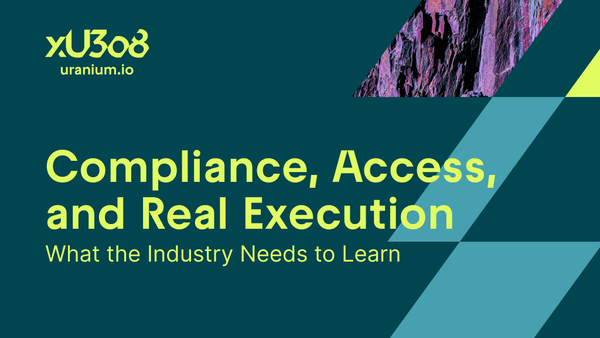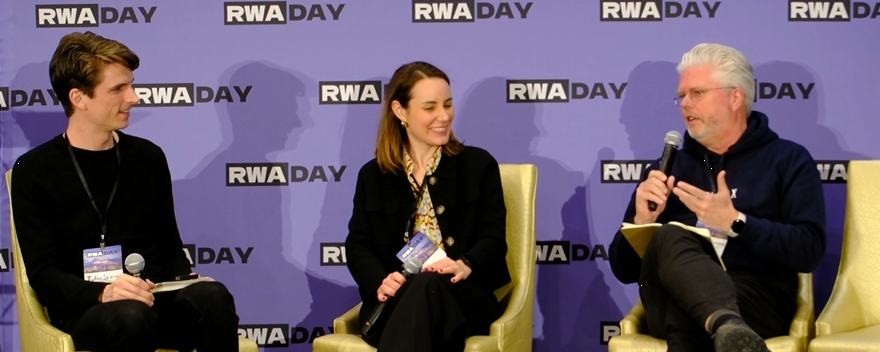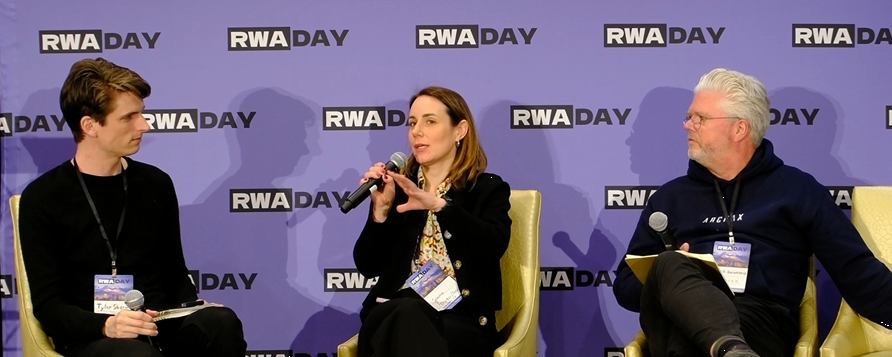Compliance, Access, and Real Execution: What the Industry Needs to Learn from Archax and Trilitech
An inside look at the RWA Day panel, where Harold Duineveld from Archax & Joanna Rindell from Trilitech discussed how they supported the creation of uranium.io
800 words, 4 minute read

Who Gets Access Is Still Controlled by Old Rules #
Access barriers define who profits and who watches from the sidelines. Rules, not technology, decide participation.
Most people can’t just put their money into commodities, real estate funds, or institutional products. Those doors have been closed for a long time unless you’re part of big finance. Sure, buying stocks is easy. Anyone can do that in a few clicks. But try to access a money market fund or buy into physical commodities, and suddenly, you face piles of paperwork, high minimums, and multiple approval layers. The whole setup keeps most retail investors on the sidelines.
Europe’s money market funds are a great example. Massive institutions control these funds, so good luck if you’re just one person trying to get in. In the U.S., investors can open their app, tap a few buttons, and complete the process in seconds. In Europe, it feels like you’re outside a locked door unless you’re part of the club.
Harold Duineveld from Archax doesn’t try to make it sound nicer than it is. He put it plainly:
“In the U.S., access to money market funds is easy. In Europe, it’s almost impossible. You’re on your knees asking your bank for yield. At BlackRock, there’s a $500 million hurdle to enter a money market fund. We slice that down to zero.”
Lowering those barriers means rewriting old rules, not finding loopholes. It forces financial incumbents to confront hard questions about access, privilege, and the durability of their control. It also opens the door to broader market participation with ripple effects beyond finance.
Uranium.io Shows How Far Compliance Can Go #
Picking uranium over something standard and simple sent a clear message: we’re serious and can handle the most complex stuff. While many choose the easier road, going with vanilla assets that nobody questions, the decision to choose one of the most heavily regulated commodities was made with the intention of showing real capability and know-how. After all, if you can manage uranium, with all the paperwork and oversight that comes with it, you’re proving you can handle real-world complexity.

Harold Duineveld explained how precise they have to be:
“As custodians, we need to know exactly where it is. Which warehouse, what part of the facility, and who can access it all need to be locked down before you can tokenize and bring it to market.”
That level of preparation shows readiness for institutional scrutiny. It proves this isn’t marketing talk but evidence that the infrastructure can handle pressure. It sets them apart in a space where many talk about readiness, but few deliver.
Physical Delivery Exists on Paper, Not in Practice #
When firms tokenize financial products, one of the first questions is whether investors can redeem them for the underlying asset. Institutions demand enforceability, even if delivery won’t be requested, because it shows the system is grounded in reality and that asset backing is more than just marketing.
Likely, most retail investors aren’t going to redeem physical uranium. That’s not the point. These rules show that the whole setup holds up. Institutions need confidence that custodians and platforms can enforce the rules. The paperwork, the custody arrangements, all of it’s in place. And anyone can check for themselves.

Joanna Rindell from Trilitech explained why redeeming physical uranium isn’t realistic:
“There are layers of strict regulations involved. Only a few places in the world are licensed to store uranium. Anyone who actually tried to redeem it would face tough compliance checks and a long list of legal requirements.”
Education and User Experience Decide Trust #
People need financial products they immediately understand
Joanna explained:
“We need to help retail investors understand what the upside is for them, why they should care about this, or invest in it. And it’s not like this space is unregulated. Even marketing financial products comes with strict compliance rules to protect consumers.”
Harold emphasized that design should shield users from complexity:
“Sometimes you have to keep the complexity away from them in the user interface. They should be able to trade just like they would with any other asset in their normal trading app.”
Archax and Trilitech didn’t treat design as an afterthought. They built trust into every layer of the product. Most projects overlook this step and lose users before they even begin.
Archax and Trilitech’s Work Is Already Real #
Archax and Trilitech demonstrated at RWA Day that this is no longer theoretical. Their systems meet compliance and custody demands and prove these models can operate beyond pilot phases.
Execution matters more than promises, especially in a space with bold claims. This panel showed who’s building. The broader industry must navigate regulatory complexity, scale across jurisdictions, and maintain trust and simplicity at every step. The next stage of finance is taking shape. You can see it in action at uranium.io